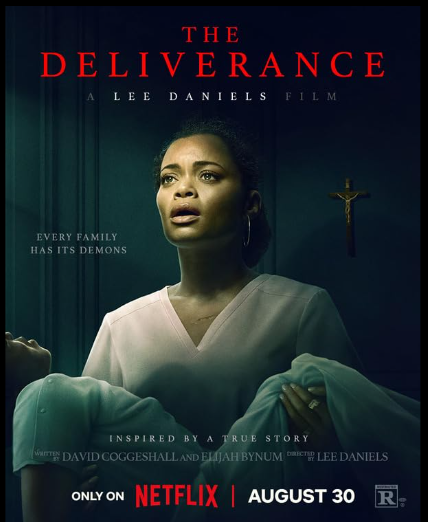
Spoiler Alert! Spoilers Ahead!
“The Deliverance” is a movie available on Netflix by the Director, Lee Daniels. The film is about the Jackson family, who has recently moved into a new home that is seemingly haunted by a demon. The family is headed by single mother, Ebony Jackson, and also includes her mother Alberta, sons Nate and Andre, and daughter Shante. The film is based on true events.
The movie starts by showing us the conflicts within the family; between Ebony and her mother, and then between Ebony and her children. Eventually we see supernatural disturbances coming from the basement of the house, starting with bad smells and an infestation of flies that gets stronger as days progress.
Synopsis
Andre, the youngest of the Jackson children, begins speaking to an “invisible” friend named Trey. Tensions are high in the household as Ebony struggles under the weight of financial burdens, alcoholism, and judgement from her mother, who dealt with her own addictions when Ebony was a child. It’s clear that the sins of the mother (Alberta) transferred onto her daughter Ebony, and the question remains as to whether or not her own children will also be affected.
Andre’s behavior is negatively impacted, and the other children are afflicted as well, but none of them seem to remember when they “black out” and behave erratically. The children and grandmother all begin to blame Ebony, who is slowly unraveling.
A social worker by the name of Cynthia visits and notices bruises on the children. She is already disturbed by Ebony’s behavior and lack of communication. An unknown woman watches the house from a car across the street. Eventually we learn this is Bernice, who calls herself an “Apostle”, and as the situation gets dire for the Jackson family reveals that she unsuccessfully tried to help the previous family, who ended up being killed by the demonic entity in the house.
Turning to Christ
Ebony eventually has a “coming to Jesus” moment in the film, as Bernice helps to strengthen her faith for the battle ahead (aka the deliverance). At this point, Ebony has shared about her own traumatic past and how she felt God had abandoned her in her time of need. I felt by this point in the movie that things moved a bit too quickly. The moment she began praying in the final battle scene and spoke in tongues, felt forced. Ebony dealt with her own demons throughout her life, as was depicted when the demonic entity took her form towards the end.
Plot Holes
The movie wasn’t perfect by any means, but that’s not to say the story didn’t need to be told.
Bernice mentioned the demon was ancient, so how did it find its way into that house? There was a hole in the basement, and this was supposed to represent a portal to Hell, but it was unclear if this was the main reason for the demonic presence.
There was a point early on in the movie where Ebony had a flashback of the man who sexually abused her, and this moment coincided with the supernatural occurrences that were beginning to manifest in the house. It was clear that the demon was preying on all of their weaknesses, but I wonder why it didn’t torment her as much, especially since everyone else was directly afflicted–Alberta was even killed by it. I wonder if the demon was always there in the house, or if somehow Ebony’s pain manifested it?
Andre was the most affected by the demon, but the film barely showed how the other children became afflicted. I also wonder what happened to Bernice’s body after she was killed by the demon. Ebony was already in trouble with the law; did she hide the body in the house?
Deliverance vs Exorcism
Bernice makes a clear distinction between an exorcism and a “deliverance” when Ebony asks her about casting out the demon from her son Andre. Bernice explains that with a deliverance, no intercession is needed–the person calls into themselves the power of Jesus Christ to cast the demons out. Whereas an exorcism requires the intercession of a Catholic Priest to cast out evil. Bernice explains that strong faith is required for a deliverance.
Black vs White
Though I feel the film lacked certain attention to detail, I’m really glad it was made. We are usually inundated by these kinds of stories told from a white perspective, depicting white characters. A “deliverance” versus an exorcism is another example in the film where Black spirituality was at the forefront.
I also loved that even though the demonic entity was already in the house, this wasn’t a film about a haunted house; the Jackson family was already “haunted” prior to moving in. Their own personal demons followed them into the new home, activating the entity that was already there. Demons feed on pain and fear, and the Jackson family was already full of these things.
Between the lines
The Deliverance was based on a true story and with my witchy eye I noticed a few details that maybe you overlooked. Lee Daniels changed the name of the real family to that of the Jacksons, and we all know the famous Michael Jackson and that Jackson family, who happened to be born in Gary, Indiana. This is the same location where the film takes place, and where the true story was based. I don’t find that to be coincidental.
We are all haunted by personal traumas and especially generational traumas, as was the case in this movie. And no one, not even the famous Jacksons, are immune to pain. Ebony carried the pain caused by being raised by her drug-addicted mother, who allowed a man to abuse her as a child. Though she wanted to be a better mother to her own children, Ebony also struggled with addiction.
Though the demonic entity manifested in the Jackson children in different ways, one has to wonder whether or not part of the erratic and violent behavior was a result of the traumas they faced while being raised by Ebony. Could part of these manifestations have been the children lashing out? Expressing their own pain, and personal demons?
Spiritual Assessment
Though the final battle scene between Ebony and the demon was rushed, the “deliverance” that took place was when Ebony finally surrendered to a higher power. Ebony and her children were “delivered” once she accepted a higher power taking over, which is why she began to speak in tongues. In essence, they were all “saved” through Divine intervention.
At the end, the Jackson family is all together (minus Alberta) in the car as Ebony drives them to Philadelphia for a fresh start. Ebony even mentions the truce between her and the father of the children, with the possibility of them working things out. The children don’t remember anything about their demonic possessions or any of the supernatural occurrences in the household. The ending, in my opinion, was smoothed over as a “happy ending” when in fact it didn’t need one. I think the audience is smart enough not to be tricked into believing that everything will be fine and dandy in the future. Was all the generational trauma wiped out once the demon was sent back to Hell? I don’t think so.
Ebony’s mother, Alberta, had to continue going to church in order to keep an inner equilibrium within herself, so as not to revert back to the monster Ebony had been raised by. Once she was “delivered”, Ebony seemed to come to terms with God and her spirituality–surrendering to what is. As a result she was eventually able to get her children back.
While yes miracles do happen through Divine intervention, work must still be done in order for healing to take place. Please don’t assume that prayer alone will “fix” everything, including your relationships. Everyone must do their part or else the personal demons will continue to follow them, and “haunt” their lives.

